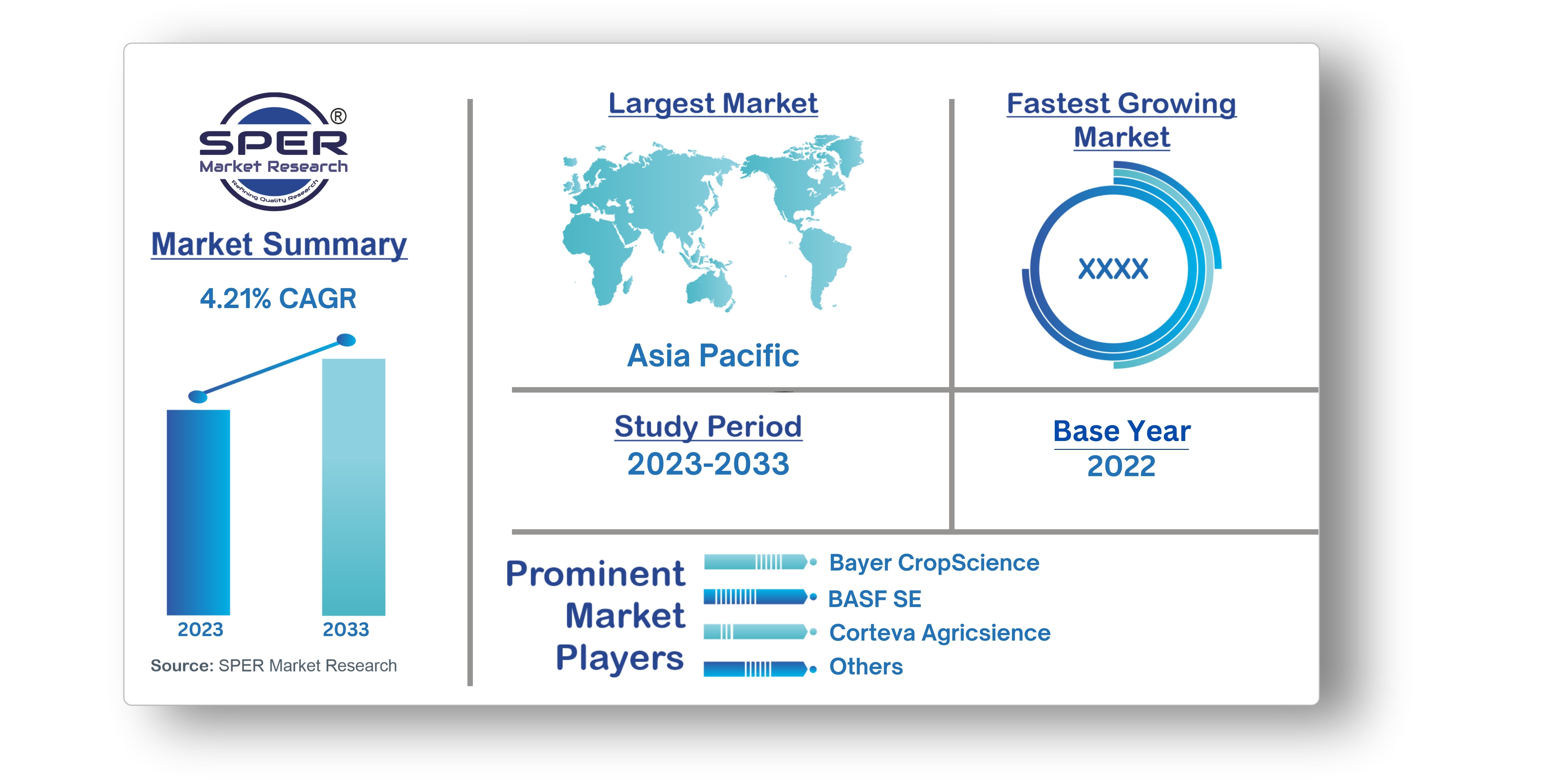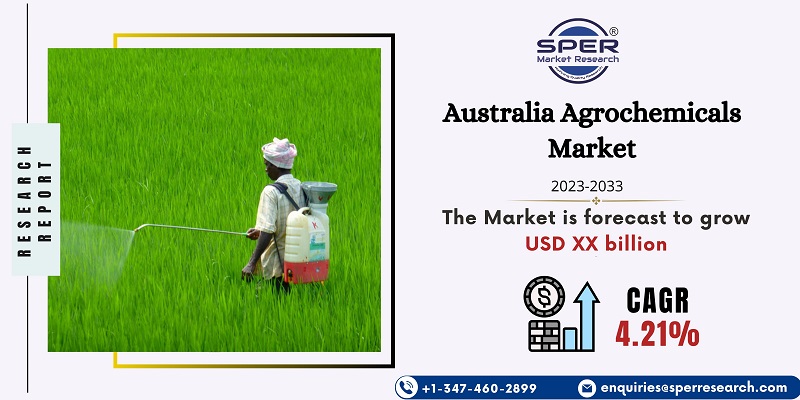
Australia Agrochemicals Market Growth, Size, Trends, Share, Revenue, Demand and Future Outlook
Australia Agrochemicals Market Size- By Product type, By Application- Regional Outlook, Competitive Strategies and Segment Forecast to 2033
| Published: Dec-2023 | Report ID: AGRI2366 | Pages: 1 - 105 | Formats*: |
| Category : Agriculture | |||
- 2022: AUSVEG joined forces with Syngenta to help growers get more out of their crops while keeping workers safe and farms profitable. Syngenta's support enables AUSVEG to continue important work in agri-political advocacy and representation on behalf of vegetable and potato growers.
- 2022: Incetic Pivot Fertilizers collaborated with Yara Nipro Liquid Fertilizers to provide farmers on Australia's east coast with liquid fertilizer options and increased supply security.


| Report Metric | Details |
| Market size available for years | 2019-2033 |
| Base year considered | 2022 |
| Forecast period | 2023-2033 |
| Segments covered | By Product type, By Application |
| Regions covered | Central Region, Southern Region, Northern Region. |
| Companies Covered | Bayer CropScience; BASF SE; Corteva Agricsience; Nufarm Ltd; Syngenta AG |
- Agrochemical Manufacturers
- Agrochemical Distributors and Suppliers
- Agricultural Research Institutions
- Farm Cooperatives
- Farmers and Agricultural Producers
- Government and Regulatory Bodies
- Industry Associations
| By Product type: |
|
| By Application: |
|
| By Region: |
|
- Australia Agrochemicals Market Size (FY’2023-FY’2033)
- Overview of Australia Agrochemicals Market
- Segmentation of Australia Agrochemicals Market By Product type (Adjuvants, Fertilizers, Pesticides, Plant Growth Regulators)
- Segmentation of Australia Agrochemicals Market By Application (Commercial Crops, Fruits & Vegetables, Grains & Cereals, Pulses & Oilseeds and Others,)
- Statistical Snap of Australia Agrochemicals Market
- Expansion Analysis of Australia Agrochemicals Market
- Problems and Obstacles in Australia Agrochemicals Market
- Competitive Landscape in the Australia Agrochemicals Market
- Impact of COVID-19 and Demonetization on Australia Agrochemicals Market
- Details on Current Investment in Australia Agrochemicals Market
- Competitive Analysis of Australia Agrochemicals Market
- Prominent Players in the Australia Agrochemicals Market
- SWOT Analysis of Australia Agrochemicals Market
- Australia Agrochemicals Market Future Outlook and Projections (FY’2023-FY’2033)
- Recommendations from Analyst
1.1. Scope of the report1.2. Market segment analysis
2.1. Research data source2.1.1. Secondary Data2.1.2. Primary Data2.1.3. SPER’s internal database2.1.4. Premium insight from KOL’s2.2. Market size estimation2.2.1. Top-down and Bottom-up approach2.3. Data triangulation
4.1. Driver, Restraint, Opportunity and Challenges analysis
4.1.1. Drivers4.1.2. Restraints4.1.3. Opportunities4.1.4. Challenges4.2. COVID-19 Impacts of the Australia Agrochemicals Market
5.1. SWOT Analysis5.1.1. Strengths5.1.2. Weaknesses5.1.3. Opportunities5.1.4. Threats5.2. PESTEL Analysis5.2.1. Political Landscape5.2.2. Economic Landscape5.2.3. Social Landscape5.2.4. Technological Landscape5.2.5. Environmental Landscape5.2.6. Legal Landscape5.3. PORTER’s Five Forces5.3.1. Bargaining power of suppliers5.3.2. Bargaining power of buyers5.3.3. Threat of Substitute5.3.4. Threat of new entrant5.3.5. Competitive rivalry5.4. Heat Map Analysis
6.1. Australia Agrochemicals Market Manufacturing Base Distribution, Sales Area, Product Type6.2. Mergers & Acquisitions, Partnerships, Product Launch, and Collaboration in Australia Agrochemicals Market
7.1. Australia Agrochemicals Market Value Share and Forecast, By Product type, 2023-20337.2. Adjuvants7.3. Fertilizers7.4. Pesticides7.5. Plant Growth Regulators
8.1. Australia Agrochemicals Market Value Share and Forecast, By Application 2023-20338.2. Commercial Crops8.3. Fruits & Vegetables8.4. Grains & Cereals8.5. Others8.6. Pulses & Oilseeds
9.1. Australia Agrochemicals Market Size and Market Share
10.1. Australia Agrochemicals Market Size and Market Share By Product type (2019-2026)10.2. Australia Agrochemicals Market Size and Market Share By Product type (2027-2033)
11.1. Australia Agrochemicals Market Size and Market Share By Application (2019-2026)11.2. Australia Agrochemicals Market Size and Market Share By Application (2027-2033)
12.1. Australia Agrochemicals Market Size and Market Share By Region (2019-2026)12.2. Australia Agrochemicals Market Size and Market Share By Region (2027-2033)12.3. Central Region12.4. Southern Region12.5. Northern Region
13.1. Bayer CropScience13.1.1. Company details13.1.2. Financial outlook13.1.3. Product summary13.1.4. Recent developments13.2. BASF SE13.2.1. Company details13.2.2. Financial outlook13.2.3. Product summary13.2.4. Recent developments13.3. Corteva Agriscience13.3.1. Company details13.3.2. Financial outlook13.3.3. Product summary13.3.4. Recent developments13.4. Nufarm Ltd13.4.1. Company details13.4.2. Financial outlook13.4.3. Product summary13.4.4. Recent developments13.5. Syngenta AG13.5.1. Company details13.5.2. Financial outlook13.5.3. Product summary13.5.4. Recent developments13.6. Others
SPER Market Research’s methodology uses great emphasis on primary research to ensure that the market intelligence insights are up to date, reliable and accurate. Primary interviews are done with players involved in each phase of a supply chain to analyze the market forecasting. The secondary research method is used to help you fully understand how the future markets and the spending patterns look likes.
The report is based on in-depth qualitative and quantitative analysis of the Product Market. The quantitative analysis involves the application of various projection and sampling techniques. The qualitative analysis involves primary interviews, surveys, and vendor briefings. The data gathered as a result of these processes are validated through experts opinion. Our research methodology entails an ideal mixture of primary and secondary initiatives.



Frequently Asked Questions About This Report
PLACE AN ORDER
Year End Discount
Sample Report
Pre-Purchase Inquiry
NEED CUSTOMIZATION?
Request CustomizationCALL OR EMAIL US
100% Secure Payment






Related Reports
Our Global Clients
Our data-driven insights have influenced the strategy of 200+ reputed companies across the globe.




















